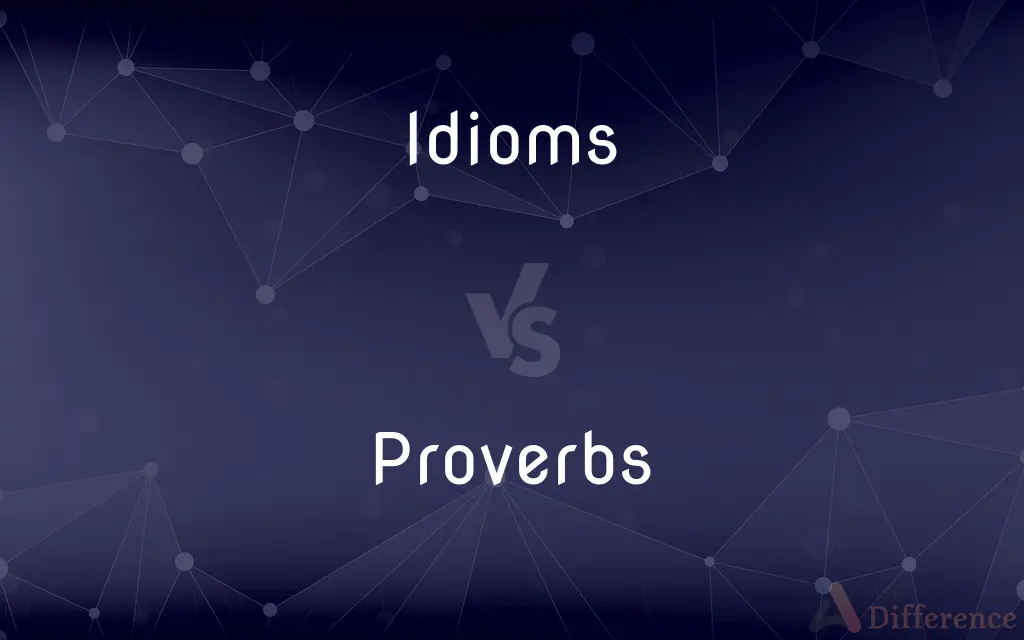Idioms vs. Proverbs — What's the Difference?
By Tayyaba Rehman — Published on December 19, 2023
Idioms are fixed expressions with non-literal meanings; Proverbs are short, well-known sayings expressing a general truth or advice.

Difference Between Idioms and Proverbs
Table of Contents
ADVERTISEMENT
Key Differences
Idioms are phrases or expressions that cannot be understood by taking the meanings of individual words; Proverbs, on the other hand, are well-known sayings that offer wisdom or advice.
While Idioms often originate from cultural, historical, or regional contexts, making their meanings non-literal and sometimes puzzling to outsiders, Proverbs usually carry universally accepted truths or observations.
Idioms can vary significantly across different languages and cultures, often leading to confusion when translated directly; Proverbs, although sometimes specific to a culture, often have equivalents in other languages due to their universal themes.
The beauty of Idioms lies in their ability to convey complex meanings in a few words, while the power of Proverbs stems from their age-old wisdom and their applicability across generations.
In essence, Idioms enrich the language by adding a layer of metaphorical depth, while Proverbs serve as timeless reminders of collective human wisdom.
ADVERTISEMENT
Comparison Chart
Definition
Phrases with metaphorical meanings not deducible from their elements
Short sayings expressing universal truths or advice
Literal Meaning
Often doesn’t make sense
Generally makes sense and is understood
Origin
Cultural, historical, or regional contexts
Wisdom passed down through generations
Translation
Can lose meaning when translated directly
Often have equivalents in other languages
Function in Language
Adds figurative richness to speech
Offers guidance or reflects on common human experiences
Compare with Definitions
Idioms
Phrases with figurative meanings distinct from literal interpretations.
Bite the bullet means face a difficult situation.
Proverbs
Short, well-known sayings expressing general truths.
Actions speak louder than words.
Idioms
Expressions with meanings that aren't deducible from individual words.
Kick the bucket means to die.
Proverbs
Timeless adages offering wisdom or advice.
A stitch in time saves nine.
Idioms
Set expressions in a language with metaphorical meanings.
The cat's out of the bag means the secret is revealed.
Proverbs
Widely recognized expressions imparting life lessons.
Where there's smoke, there's fire.
Idioms
Combinations of words with meanings not transparently clear from their parts.
Break a leg means good luck.
Proverbs
Brief statements that convey moral lessons.
Every cloud has a silver lining.
Idioms
Figurative phrases whose meanings can't be inferred from the meanings of their individual words.
Spill the beans means reveal a secret.
Proverbs
Common sayings reflecting universally accepted truths.
Birds of a feather flock together.
Idioms
A speech form or an expression of a given language that is peculiar to itself grammatically or cannot be understood from the individual meanings of its elements, as in keep tabs on.
Proverbs
A short pithy saying in frequent and widespread use that expresses a basic truth or practical precept.
Idioms
The specific grammatical, syntactic, and structural character of a given language.
Proverbs
Proverbs (used with a sing. verb) See Table at Bible.
Idioms
Regional speech or dialect.
Proverbs
Plural of proverb
Idioms
A specialized vocabulary used by a group of people; jargon
Legal idiom.
Proverbs
An Old Testament book consisting of proverbs from various Israelit sages (including Solomon)
Idioms
A style of artistic expression characteristic of a particular individual, school, period, or medium
The idiom of the French impressionists.
The punk rock idiom.
Idioms
Plural of idiom
Common Curiosities
Do Proverbs have non-literal meanings?
Generally, proverbs have literal meanings that convey wisdom or advice.
Why are Proverbs considered valuable?
Proverbs offer age-old wisdom, guidance, and reflect common human experiences.
What are Proverbs?
Proverbs are short sayings that convey general truths or advice.
Can you give an example of a Proverb?
Sure, "Honesty is the best policy."
Can Idioms change over time?
Yes, idioms can evolve or fade with changing cultures and contexts.
What are Idioms?
Idioms are phrases whose meanings aren't directly derived from their individual words.
Are the meanings of Idioms always literal?
No, idioms often have non-literal, figurative meanings.
Can you give an example of an Idiom?
Yes, "raining cats and dogs" means "raining heavily."
Why do Idioms often not make sense when translated?
Idioms are culturally and contextually specific, making direct translations often nonsensical.
Why are Idioms important in language?
Idioms enrich language by adding figurative depth, making expressions colorful and vivid.
Are Proverbs unique to specific cultures?
While some proverbs might be culturally specific, many convey universal truths and have equivalents across cultures.
Are Proverbs always old sayings?
While many proverbs are ancient, new ones can emerge based on contemporary wisdom and experiences.
Do all languages have Idioms?
Yes, idioms exist in every language, though their meanings and expressions vary.
Is it essential to know Proverbs in a language?
While not essential, knowing proverbs can offer cultural insights and improve language fluency.
Are Idioms and Proverbs the same?
No, idioms are metaphorical expressions, while proverbs are sayings offering wisdom or advice.
Share Your Discovery

Previous Comparison
Strategic Control vs. Operational Control
Next Comparison
Proton vs. ElectronsAuthor Spotlight
Written by
Tayyaba RehmanTayyaba Rehman is a distinguished writer, currently serving as a primary contributor to askdifference.com. As a researcher in semantics and etymology, Tayyaba's passion for the complexity of languages and their distinctions has found a perfect home on the platform. Tayyaba delves into the intricacies of language, distinguishing between commonly confused words and phrases, thereby providing clarity for readers worldwide.
















































